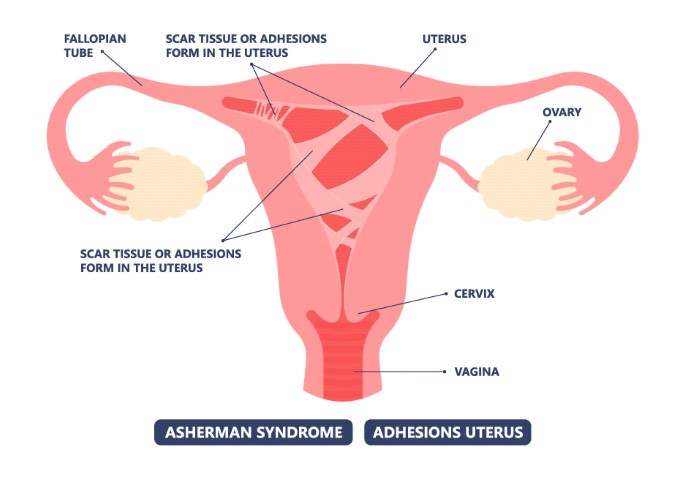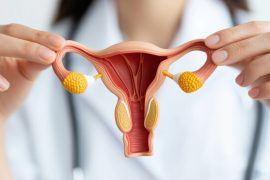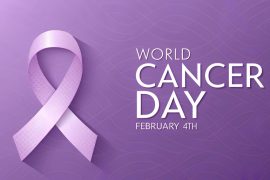Cancer refers to a disease/condition in which cells grow and multiply uncontrollably in one organ to form a tumor, and spreads to the other parts of the body. Tumors can either be cancerous or benign. As the name itself suggests, ovarian cancer is a type of cancer that develops in the ovaries. The female reproductive system contains two ovaries on each side of the uterus, which are responsible for producing eggs and estrogen.
Though not common, ovarian cancer causes more deaths among women than other types of cancers. In most cases, it is difficult to detect ovarian cancer in the early stages. Ovarian cancer goes undetected until it has spread to the pelvis, abdomen, and nearby areas. In this advanced stage, the cancer is quite difficult to treat. However, early-stage ovarian cancer that is confined to the ovaries is more likely to be treated successfully.



Symptoms of Ovarian Cancer
As mentioned earlier, ovarian cancer is unlikely to be detected in the earlier stages as there may be fewer to no symptoms. The early symptoms may also resemble those of other conditions such as premenstrual syndrome and other bladder-related problems. However, it is important to consult with your medical practitioner if the symptoms persist. Some of the most common ovarian cancer symptoms include:
- Immense pain or pressure in the pelvic area
- Abnormal bloating
- Pain in the back/abdomen
- Unusually frequent/less frequent urination
- Changes in bowel habits
- Weight loss
- Loss of appetite
- Nausea
- Shortness of breath
- Fatigue
- Irregular periods
- Vaginal bleeding
The symptoms also tend to change when cancer spreads to other parts of the body. It is important to make an appointment with your doctor if any of these symptoms worry you, or if you have a family history of ovarian cancer.
Causes of Ovarian Cancer
Though there are no definitive causes that lead to ovarian cancer, there are several factors that can increase the risk of one being diagnosed with ovarian cancer. These risk factors include:
Age
The risk of developing ovarian cancer increases with age. Ovarian cancer mostly develops in women who have reached menopause. Around 50% of ovarian cancer cases are found in women above the age of 63.
Family history of cancer
Having a near family member with a history of ovarian cancer, breast cancer, or even colorectal cancer, can increase the risk of developing the condition. This is because cancer can be caused by an inherited mutation in certain genes.
Hormone replacement therapy
Women undergoing Hormone Replacement Therapy (HRT) after menopause is at an increased risk of developing ovarian cancer. The longer the Hormone Replacement Therapy is given, the higher the risk. However, the risk reduces when the treatment stops.
Reproductive history
Women who have undergone one or more full-term pregnancies are at a lower risk of developing ovarian cancer. Breastfeeding also contributes to reducing the risk of ovarian cancer. However, having children after the age of 35 or never having a full-term pregnancy can increase the risk.
Breast cancer
Women diagnosed with breast cancer or with a history of breast cancer are also at a higher risk of developing ovarian cancer. This is mostly due to the changes in the BRCA gene.
Obesity
Obesity has been linked to the risk of developing many types of cancer. Women with a Body Mass Index (BMI) of over 30 are more likely to develop breast cancer.
Androgens
Having high levels of androgens (male hormones), such as testosterone may increase the risk of ovarian cancer. Certain androgens lead to specific types of ovarian cancers.
Prevention of Ovarian Cancer
Most women are likely to have one or more risk factors that may lead to ovarian cancer. Like most cancers, though there aren’t sure-shot ways to prevent ovarian cancer, you can work towards reducing and eliminating certain risk factors that may lead to the condition. Some of the precautions that can be taken to reduce the risk are:
Maintain a healthy weight
One of the most common causes/risk factors for all cancers is obesity. Ensure that you maintain a healthy weight and follow good dietary habits with an exercise routine to keep your Body Mass Index (BMI) in check.
Avoid HRT
Avoiding Estrogen Hormone Replacement Therapy after menopause can reduce the risk of developing the disease considerably.
Birth control pills
Using oral contraceptives, commonly known as birth control pills, decreases the risk of developing ovarian cancer. Talk to your healthcare provider about birth control pills and which ones may be right for you. However, birth control pills also have certain side effects and other associated risks, so discuss the advantages and disadvantages before taking them.
Gynecologic surgeries
Gynecologic procedures such as tubal ligation and hysterectomy may help in reducing the risk of certain types of ovarian cancer. However, these procedures have to be done only for valid medical conditions, and not just the reduce the risk of ovarian cancer.
Pregnancy and breastfeeding
Women who have had one or more full-term pregnancies before the age of 26 have a lower risk of developing ovarian cancer as compared to women who have not. Breastfeeding helps in lowering the risk even further.
If you or your loved one has been diagnosed with ovarian cancer, you can discuss with your medical practitioner about the various treatment methods. You need to understand the pros and cons of each treatment option before finalizing one. Some of the most common treatment options for ovarian cancer include surgery to remove the tumors, radiation therapy, chemotherapy, hormone therapy, and targeted therapy. Treatment can also vary depending on the type and stage of ovarian cancer.
Though there are no definitive ways to prevent ovarian cancer, it is important to be aware and fully informed of the symptoms. Approach your doctor or healthcare provider immediately, if you notice one or more of these symptoms in you or your loved ones; as early detection saves lives. You can also work towards reducing certain risks associated with the disease by following a healthy lifestyle and taking precautions. Remember, prevention is better than cure!





Comments are closed.